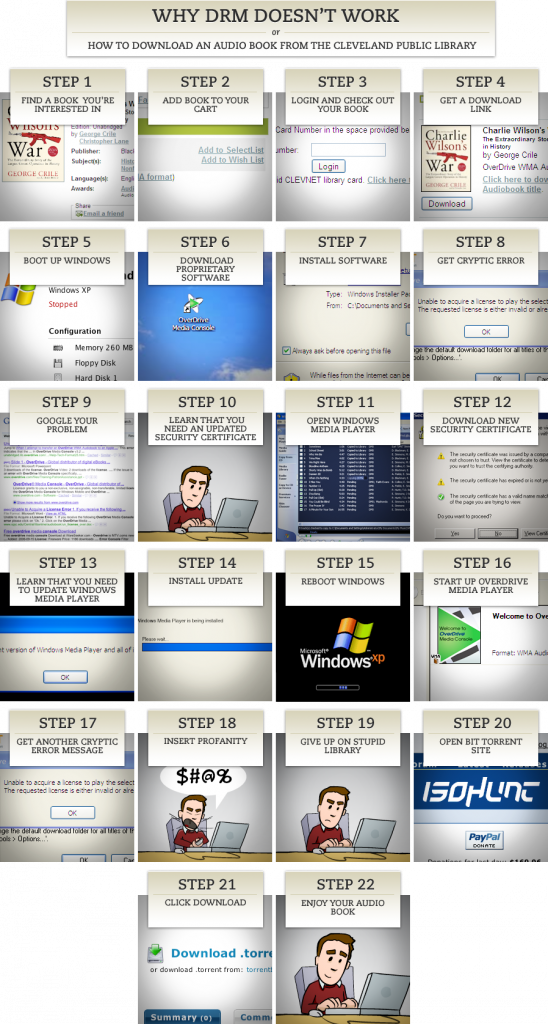PA DIGITAL PUBLISHING FORUM - Lending Models (e-books)
Notes from the PA Digital Publishing Forum
Wednesday 10th November 2010
</p>
Overview
The industry spotlight has fallen on e-book lending in recent months, as public libraries thrash out appropriate models and academic libraries explore the possibilities of a nascent market. Whatever the shape of e-book lending in the future, the lending debate shows how e-books have enabled radically different business and commercial models - this DPF will explore e-book lending from both trade and academic publishing points of view.
Speakers include Ruth Jones, Director, Publisher Business Development, Ingram Content Group, Martin Palmer, Principal Officer: Libraries for Essex County Council, Stephanie Duncan, Digital Director, Bloomsbury Publishing, and Mark Majurey, Digital Development Director, Taylor & Francis.
Martin Palmer, Principal Officer: Libraries for Essex County Council
Martin was the only librarian on the day. He started by laying out the fact that Libraries have been digital for the past 10 years, since the start of New Labour with Tony Blair and have been ever since. They started with computers and internet and quickly moved into 'e-reference' which was not just reference, but also newspapers and online databases, like D&B, Grove Online, Stories from the web.
Starting in 2000 Libraries started with e-books as well, with large pilots in 2003. Lessons learned from these pilots was mostly: e-books are great for housebound or mobile (think commuter) users.
His message is clear. This isn't a new thing, libraries have been doing e-things for years and years.
Demand
Now there is an explosion of library users with modern e-book devices. The entire e-book world (buying, connecting, formats, DRM) is very confusing, he showed the wikipedia image on e-books to explain. Libraries are asked to help, they often cannot.
However, clearly people want to get e-books from libraries and libraries want to be able to provide them.
Models
There are two main models for libraries:
- streaming/subscription (e.g. ebrary)
- download (e.g. Overdrive)
There are lots and lots of aggregators and business models and the field keeps moving around. Seems like subscription model requires people use a computer to read only, no devices. Users never get full book, only a page at a time. Download is usually Adobe DRM based, so e-books readers, like Sony can use them.
PRM: Payment models seem very print book oriented. Overdrive makes Library, pay an annual fee, then a fee for each book, which allows one user at a time to read for some period of time (usually 14 days). Subscriptions are more crazy with user restrictions, but the books can be recycled in much smaller units of time.
Stephanie Duncan, Digital Director, Bloomsbury Publishing
Stephanie was really well prepared for her talk. She basically explained that there are massive challenges to what is happening digitally vs. the print world.
| Physical | Digital |
|---|---|
| defined catalogue | limitless catalogue |
| one copy, one user | simultaneous access |
| one off purchase | annual purchase (?) |
| budget led acquisition | user led acquisition |
She then explained Bloomsbury's streaming service for Libraries, which does not work on e-book devices, has a simple pricing model (10 books for £100 for 100,000 users for 1 year - buy as many as you want).
PRM: Clearly, this is simple for the library, if they can estimate usage. Publishers like it because there are few DRM issues. Users can't download the book, or use in their devices… not good.
Tim Godfrey, The Bookseller
Tim started with a story about how Surrey Libraries have an incredibly open e-book lending service that allows anyone, anywhere to have 14 days access to e-books. He personally got a DK Scottish Guide-book and didn't buy one from a bookstore. (BAD)
He then pointed out, that since the end of the NET pricing agreement, high street book selling has declined very year for the past 15 years and the entire system is very fragile.
Very nervous about libraries offering e-books, specially few little restrictions. He knows this hurts booksellers, but also thinks it will hurt libraries in the long run. He recommends:
- libraries only loan to registered users who can verify their address (in their region)
- provide exceptions for housebound and disabled
- stick to the one book/one load model
- make borrowers pay
Then went on to say, we must all support libraries, socially important role. Councils must give more money to libraries to buy books.
Ruth Jones, Director, Publisher Business Development, Ingram Content Group
Ingram has an aggregator, MyiLibrary, but she spoke about their academic product.
Key points are:
- system works because all users are authenticated - vpn and either shibboleth or athens - no 'chinese hackers'
- DRM on top of that, so no downloads, just streaming.
- Have user selected titles, where if up to X people try to get a book, the system does buy the book and charges the university
- system allows for inter-library loans (PRM my GOD how messed up is that!)
Mark Majurey, Digital Development Director, Taylor & Francis
Mark basically reiterated most things previously stated, specially academic lending required a defined population with bullet-proof authentication. All their stuff is browser based flash stuff. Only starting to look at ebooks and consumers for a very few titles.
Also raised the dual issues of:
- libraries need to make things simple
- all consumer models are highly dangerous if you make them simple.

Conclusions
My personal take-aways and opinions only.
- libraries want to please their users, they want to loan trade e-books
- booksellers want any lending of e-books to be very, very restricted
- e-book devices are popular now
- getting e-books onto e-book devices is very confusing for users
-
the academic models do not work for libraries
- not a closed audience
- complex authentication too hard to use and manage
- streaming doesn't get to the e-book devices that library users want
- licensing seems complex and budgets too open ended for libraries with little money
My recommendation
Libraries should create a e-book rental model like www.lovefilm.com where users can download up to X e-books, they must return them before getting a new one. They will charge their readers £4 a month with concessions.
- The formats will be ePub only
- No DRM, but Watermark the books
- Up-sell the full book and profit
If they don't do this, someone else will (probably with DRM)!
No slideshow images defined in front matter for this page.


Comments
Add a comment